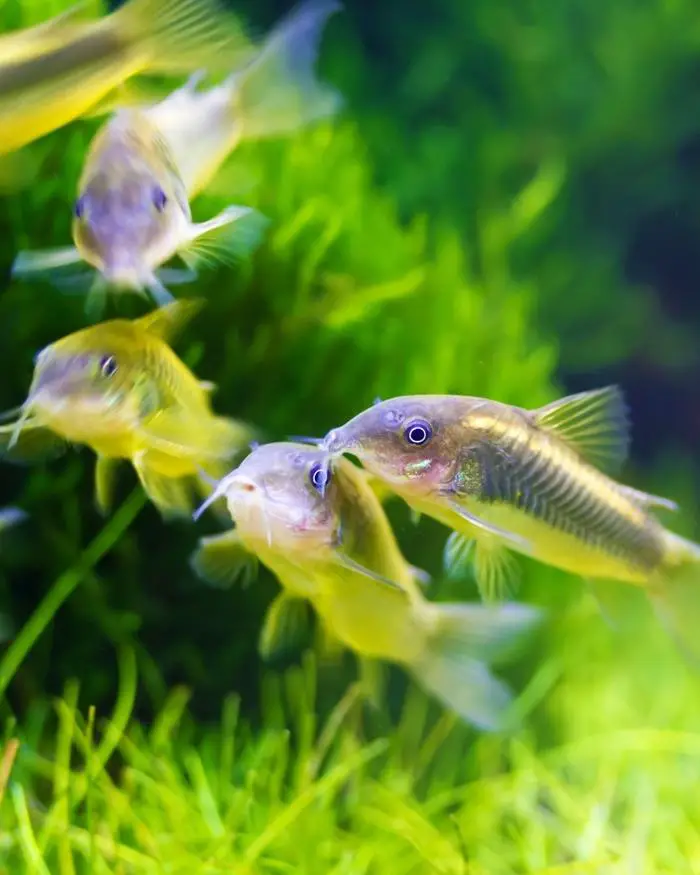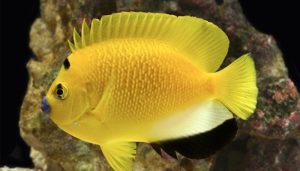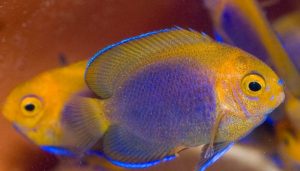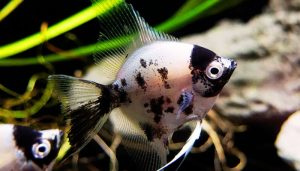Do Corydoras eat vegetables? As passionate aquarists, we have all encountered the same question: what vegetables do Cory catfish eat? After all, their small stature and cute personalities make them one of the favorite fish for beginner hobbyists.
While many freshwater species enjoy a plant-based diet, Cory catfish are especially adept at feeding on aquatic vegetation – check out their robust whiskers!
To provide insight into this vital topic, we’ve compiled a comprehensive guide that reveals exactly which five veggies Cory cats love to consume.

So if you want to expand your underwater herbivore’s culinary repertoire, this is the post for you!
Table of Contents
ToggleCan Corydoras Eat Vegetables?
Do Cory catfish eat vegetables? Yes! Corydoras catfish are omnivorous creatures, meaning they can consume animal and plant-based fare.
That said, their natural diet consists mainly of aquatic vegetation, so we recommend including various veggies in Cory’s diet.
Not only will these nutritious treats contribute essential vitamins and minerals to their diet, but they will also provide beneficial fiber and texture – both of which are necessary for ideal digestive health.
What Vegetables Do Cory Catfish Eat?
Cory catfish are omnivorous bottom feeders that enjoy a varied diet of sinking pellets, algae wafers, live or frozen foods, and vegetables. They want blanched or boiled vegetables like zucchini, squash, cucumbers, and lettuce.
These vegetables provide essential vitamins and fiber, complementing their primary diet. When introducing vegetables to your cory catfish, start with small pieces and observe their eating behavior.
You can gradually increase the amount offered if they readily consume the vegetables.
Ensure the vegetables are blanched or boiled to soften them and make them easier to digest. Overfeeding with vegetables can lead to water quality issues, so moderation is key.
TOP 5 Best Vegetables for Cory Catfish
1. cabbage: Shredded cabbage is a great choice for Cory catfish, as it contains loads of vitamin C and other important nutrients. Plus, its crunchy texture helps to wear down their strong teeth.
2. Zucchini: This low-calorie veggie is a great option for Cory cats, as it provides much-needed fiber that helps keep their digestive system running smoothly. It’s also an excellent source of vitamin A and calcium!
3. Lettuce: Romaine lettuce is an excellent option for Cory cats, as it contains essential nutrients like vitamin C and iron. Plus, the crunchy texture helps clean the teeth and keep them healthy!
4. Spinach: Spinach is a terrific source of calcium, iron, magnesium, and other vital minerals. It’s also extremely low in calories, making it a healthy snack that’s easy to digest.
5. Carrots: Carrots are an excellent source of beta carotene and vitamin A, which are essential for optimal health in Cory cats. Plus, their crunchy texture helps clean the teeth and promotes dental hygiene.
What Is Corydoras Favorite Food?
What do Cory catfish eat? Corydoras, a freshwater fish native to South America, primarily eats brine shrimp, tubifex worms, bloodworms, bottom feeder tablets, and other small invertebrates.
They also feed on vegetable matter, such as algae wafers and spirulina pellets. Given their omnivorous diet, they are relatively easy to please regarding their food selection.
We recommend offering various types of food to ensure your Cory cats receive all the essential vitamins, minerals, and nutrients they need for optimal health. This will keep them energetic and vibrant in your aquarium!
What Is a Cory Fish Diet? (Best Cory Cat Diet)
What do Corydoras eat? The best Cory cat diet consists of various foods, including protein-rich fares such as brine shrimp and bloodworms.
It’s also important to include some vegetable matter in their diet. This can be anything from blanched zucchini slices to small peas – make sure that the veggies have been prepared correctly (i.e., blanched or softened) so they’re easy for the Cory cats to digest.
In addition, we recommend providing your Cory cats with high-quality commercial food specially formulated to meet their nutritional needs.
Cory Catfish Diet and Feeding Tips
- Feed your Cory cats a variety of food items to ensure they get all the essential nutrients and vitamins they need for optimal health.
- Provide soft-bodied foods such as bloodworms, brine shrimp, and daphnia for protein.
- Include some vegetable matter in Cory catfish diet – blanched or softened veggies are best!
- Provide high-quality commercial food formulated specifically for Cory catfish.
- Feed your Cory cats twice a day, in small amounts. This will help prevent overfeeding and keep them active and healthy.
- Avoid feeding large chunks of food, which can lead to choking or digestive blockages.
- Remove any uneaten Cory catfish food from the tank after a few minutes, as this will prevent polluting the water and ensure that your Cory cats get what they need to thrive.
- Offer treats occasionally but in moderation – too many treats can lead to obesity or other health issues.
We hope these tips help you provide your Cory cats with the best possible nutrition and happy life in your aquarium!
How Much and How Often Should Corys Be Fed?
How Often Feed Corydoras Catfish? Corys should be fed two to four times a day, containing roughly 1-2 tablespoons of food each meal. Food should consist of sinking pellets and live or frozen foods such as brine shrimp and bloodworms.
Corys should occasionally receive supplemental feedings of fruits, vegetables, and boiled eggs to provide the right balance of vitamins and minerals.
A good rule is to feed juveniles every other day on a strict diet, while adult Corys can be fed every day with small amounts of supplemental items included in their daily meals.
How Long Can Cory Catfish Go Without Food?
A healthy adult Cory catfish can go up to 2-3 weeks without food. This is because they are efficient at using their stored energy reserves, but it shouldn’t be a habit to starve them despite how resilient they may seem.
It is important to feed them regularly and supplement their diet with live or frozen food options such as worms, brine shrimp, or bloodworms.
In addition, Cory catfish need a heavily planted aquarium with plenty of hiding spots to feel safe and secure so that when it comes time for meals, they can feed actively and stay healthy!
What Does Cory Catfish Eat in Their Natural Habitat?
What does Corydoras eat in the wild? Cory Catfish eat various foods in the wild, including insect larvae, worms, and tiny crustaceans. They are omnivorous fish and scavengers that forage for food in the substrate of their natural environment.
As bottom feeders, they will consume bits of algae and plant matter from the sediment at the bottom. Additionally, they have also been known to be picky eaters of small insects as well as bite-sized pieces of fish flakes or pellets.
Do Cory Catfish Like Lots of Plants?
Yes, Cory Catfish love plenty of plants in their environment as they offer them hiding spots and security. As bottom feeders, they also scavenge for food at the bottom of the tank and munch on small bits of algae that tend to grow on the leaves of aquatic plants.
Therefore, adding a variety of live and plastic plants can be beneficial for your Cory Catfish. However, leave enough open space for them to swim freely!
Can Cory Catfish Eat Carrots?
Yes, Cory Catfish can safely eat carrots. Carrots are an excellent source of vitamins and minerals essential for fish health. They can be offered as supplemental food but should not cover the bulk of the diet.
Carrots should always be peeled and cut into small pieces before being added to the tank, as large chunks can potentially cause choking or digestive blockages.
They should also be blanched or boiled before feeding, making them softer and easier for the fish to consume.
Do Corydoras Eat Zucchini?
Do Cory catfish eat zucchini? Corydoras catfish can safely eat zucchini. Zucchinis are packed with minerals and vitamins that benefit fish health and can be offered as supplemental food.
However, it’s important not to overfeed them with zucchini, which can lead to nutritional imbalances and obesity. The zucchini should be peeled, cut into small pieces, blanched, or boiled before feeding, and only offered in small amounts.
do corydoras eat cucumber?
Do corys eat cucumber? Corydoras can eat cucumber. Cucumbers are a healthy and nutritious snack for Corydoras, as they are a good source of vitamins and fiber. However, cucumbers should not be the sole food source for Corydoras, as they need a variety of foods to stay healthy.
Can Cory catfish eat cucumber? To feed cucumbers to your Corydoras, slice off a thin piece of cucumber and sink it into the bottom of the tank. Corydoras will nibble on the cucumber throughout the day. You can also blanch the cucumber for a few minutes before feeding it to your corydora, making it softer and more accessible for them to eat.
Do Cory Catfish Eat Algae?
Yes, Cory Catfish do eat algae to some extent. However, their diet primarily comprises prepared foods like shrimp pellets and flakes and frozen food such as bloodworms and chopped clams.
In the wild, Corydoras feed on plant matter, but relying on algae as a sole source of sustenance for them is not recommended in an aquarium setting.
They may nibble at the occasional green filament or film algae while scavenging, but it will not provide them with adequate nutrition over the long term.
Can Cory Catfish Eat Pellets?
Yes, Cory Catfish can eat fish pellets as part of their diet. Pellets are a convenient way to provide a balanced diet packed with essential vitamins and minerals.
However, choosing high-quality fish food with the correct size for your specific fish species is important. Cory Catfish should be fed sinking pellets that are small enough to consume comfortably.
It’s also important to vary their diet with live or frozen worms, brine shrimp, and bloodworms.
Do Cory Catfish Eat Snails?
Yes, Cory Catfish may eat snails to some extent. However, it’s important to note that they don’t actively hunt for food like larger fish species.
Rather, they are opportunistic scavengers that take advantage of other food sources, such as small bits of algae and plant matter from the substrate.
Therefore, you should not rely on snails as the primary food source for your Cory Catfish. Instead, provide them a balanced diet of prepared fish foods such as flakes and pellets and frozen live foods like worms and baby brine shrimp. This will ensure their health and longevity in the aquarium!
Do Cory catfish eat poop?
No, Cory catfish don’t eat poop. Their diet comprises various organic matter such as algae, small insects, and dead plant material. As they are bottom-feeding scavengers looking for food on their habitat’s substrate, it is highly unlikely that they would come across any feces.
Even if they did, there wouldn’t be any nutritional value in it, so that it wouldn’t provide them with the required sustenance for survival. Therefore, Cory catfish do not eat poop!
Can Cory Catfish Eat Peas?
Yes, Cory Catfish can eat peas as part of their diet. Peas are an excellent source of vitamins and minerals that benefit fish health. They should be peeled and blanched before being added to the bottom feeder fish tank, as large chunks can potentially cause choking or digestive blockages.
It is important not to overfeed them with peas as this can lead to nutritional imbalances and obesity. Peas should only be offered as supplemental food to round out their diet.
Additionally, it is important to vary their diet with other food items such as live or frozen worms, brine shrimp, and bloodworms to ensure they are getting the essential nutrients they need.
Do Cory Catfish Eat Brine Shrimp?
Yes, Cory catfish readily accept brine shrimp as food. Brine shrimp are an excellent source of nutrition for these fish and can be used in conjunction with other foods, such eat shrimp pellets as flake food or pellets.
Brine shrimp provide a great balance of protein and fat and contain high levels of vitamins, calcium, magnesium, and phosphates, which help promote healthy growth.
Additionally, Cory catfish have several natural urges to search for small prey, making them highly attracted to the movement of small frozen or live brine shrimp.
Do Cory Catfish Eat Algae Wafers?
Yes, Cory Catfish do eat algae wafers. Algae wafers are generally an excellent primary food source for these fish, specifically formulated to provide adequate protein and other essential nutrients.
They will also feed on cucumbers or other vegetables you can offer them. You should give them different food sources to ensure their diet remains balanced and varied.
They should be fed sparingly since they are quite dense and can lead to overfeeding if given too much. Choosing an algae wafer suitable for your fish’s size is important, as large pieces may not be eaten or swallowed properly.
Do Corydoras Like Cucumber?
Yes, Corydoras will feed on cucumbers. Cucumbers are a natural source of nourishment for these fish in the wild.
Cucumbers help supplement the diet of Corydoras by providing essential vitamins and minerals that they wouldn’t get from their traditional food sources, such as insects and small crustaceans.
Feeding your Corydoras small slices or pieces of cucumber is beneficial to their health and can even be used as a treat!
Do Cory Catfish Eat Bloodworms?
Yes, Cory Catfish are omnivores who love to eat worms. Live blackworms, frozen bloodworms, and Hikari Freeze-Dried Blood Worms are all great options for Cory Catfish!
They will happily snack or graze on whatever worms you feed them, so feel free to mix it up depending on their preferences. Just ensure the worms are small enough for the catfish to consume safely!
Frozen Food for Corydoras
Corydoras also accept frozen food in their diet. Frozen foods such as brine shrimp, bloodworms, white worms, and mosquito larvae make great snacks or supplemental meals for these fish.
Frozen foods are generally easier to digest than live food and have a higher nutritional value than other types of processed fish food. Plus, they provide variety in the diet, which helps to keep your Corydoras healthy and happy.
When feeding frozen food to your Corydoras, it is important to ensure you thaw them out beforehand and always feed them in moderation. Too much-frozen food can lead to digestive problems or obesity.
Veggie Clip for Aquarium
A veggie clip can be an excellent tool for feeding Corydoras. A veggie clip is a device that attaches to the side of the aquarium and holds pieces of vegetables or other food items in it.
This allows you to easily provide your fish with fresh veggies while keeping them away from other fish, decorations, or plants in the tank.
Corydoras will readily feed on the veggies offered in the veggie clip. It also prevents them from swallowing items that could be harmful or cause choking or digestive blockages.
Overall, veggie clips are a great way to supplement your fish’s diet with fresh vegetables while preventing overfeeding and mess in the tank.
What Do You Feed Corydoras Fry?
What to feed Cory catfish babies? The healthiest diet for Cory catfish fry is Baby brine shrimps or artemia nauplii. These tiny crustaceans are an excellent source of protein and nutrition to feed your Cory catfish fry, as they contain high levels of vitamins and minerals essential for growth and development.
Other foods such as daphnia, microworms, or even newly hatched brine shrimp eggs can also be used in moderation. It is important to feed your fry several small meals per day, as overfeeding can lead to unhealthy water conditions or bloating in the fry.
Conclusion
As you can see, Cory catfish have various vegetable dietary options. They get the nutrition and fiber from vegetable matter and may also help keep the tank cleaner by devouring any rotting vegetation in their space. Cory catfish will not eat all types of vegetables and should not be forced to eat vegetables they don’t like, as this may cause them to become ill or malnourished.
Additionally, although vegetables benefit Cory catfish, they should not be the only food source in their diet and should ideally only be fed two to three times per week. If you plan on incorporating vegetables into your Cory catfish’s diet, always observe how your fish reacts so that you can make sure you provide them with the very best food and care possible. So, what vegetables do Cory catfish eat? With careful monitoring and the right dietary choices, Corydoras catfish thrive and offer many years of enjoyment!
You might also like
- Best Food for Cory Catfish Diet: 15 Picks for Optimal Health
- Cory catfish diseases: Treatment, Causes & Prevention Tips
- Cory Catfish Temperature – The Ultimate Care Guide for 2023
- What Do Spotted Raphael Catfish Eat: (A Comprehensive Guide)
- Spotted Raphael Catfish: Diet, Tank Mates, Diseases & (More)
- What Do Cory Catfish Eat in a Tank? (Corydoras Food List)
- How Often Do You Feed Cory Catfish: 5 Tips for Explosive Growth!
- Corydoras Green: Ultimate Care Guide, Tank Mates & More!




